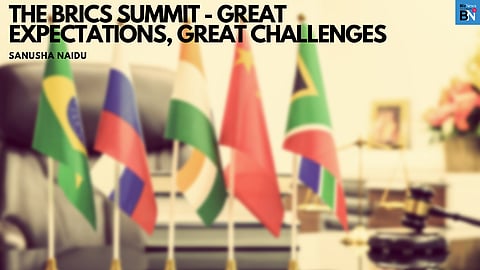The BRICS Summit – Great expectations. Great challenges…
After months of diplomatic and legal drama over the attendance and then the non-attendance of Russian President Vladimir Putin, the focus is now on the agenda at the BRICS Summit in South Africa next month. There is much hype over speculation that this BRICS Summit could open the door to a new world order with a move towards "de-dollarisation" and the induction of powerful new members like oil-rich Iran and the UAE. BizNews asks Sanusha Naidu, Senior Research Fellow at the Institute for Global Dialogue, what outcomes can realistically be expected. – Chris Steyn
Sign up for your early morning brew of the BizNews Insider to keep you up to speed with the content that matters. The newsletter will land in your inbox at 5:30am weekdays. Register here.
Watch here
Relevant timestamps from the interview
- 00:09 – Introductions
- 00:39 – Sanusha Naidu on the BRICS currency
- 08:55 – On what can really happen at this summit as far as expansion is concerned
- 16:33 – On the unrealistic expectations surrounding the Summit
- 20:01 – On the non attendance of Russian president Putin
- 23:17 – Conclusions
Listen here
Highlights from the interview
After months of diplomatic and legal drama over the attendance and then the non-attendance of Russian President Vladimir Putin, the focus is now on the agenda at the BRICS Summit in South Africa next month.
There is much hype over speculation that this BRICS Summit could open the door to a new world order with a move towards "de-dollarisation" and the induction of powerful new members like oil-rich Iran and the UAE.
BizNews asks Sanusha Naidu, Senior Research Fellow at the Institute for Global Dialogue, what outcomes can realistically be expected.
On the prospects of "de-dollarisation", Naidu says: "This is what I think is very important for us to understand, because what happens both on the side of official policy, on the side of commentating and other issues, is the question around conflating the BRICS thinking on creating a BRICS currency as a reserve global currency with de-dollarisation.
"The interdependence of the dollar as well also poses certain important considerations for the BRICS countries to think about, because it cannot be that we enter into a debate based on sound bites and just picking up little things that we hear here and there and say, well, we need to de-dollarize.
"At this point in time, I think the BRICS countries and in particular, the countries that have a significant level of impact in terms of exposure to the dollar…we've got to temper our thinking right now; we've got to be much more pragmatic; we've got to think about it in a much more mature way that it's not something that's just going to happen. It's talk, but I think it's about how do you transact in currencies amongst the BRICS countries in terms of using their local currency for financial transactions and trade transactions."
One the expansion of BRICS, Naidu says: "The sense one gets is that right now they're still deciding on what will be the consensus, not necessarily the criteria already decided, what will be the consensus on the criteria for enabling other countries to join an expanded BRICS group. And that I think is interesting because it tells you that you have to find that common agreement amongst the five core members, the nucleus countries that make up the BRICS.
"And obviously there are challenges if you're going to just open it up without necessarily having criteria, framework principles…maybe best practice looking at other regional organisations or other organisations that have had a kind of, not a quick kind of approach, but a staggered approach to expansion.
"So I don't think we're going to have a decision at the summit to say that we've decided unanimously that this is the criteria and so we're going to get countries to come in. I think they're going to say we're still giving due consideration and engagement in order to effect a much more agreeable…and a consensus around the criteria because it's a big step for the BRICS to start expanding."
Naidu warns: "You have to be tempered. You have to look at the dynamics as well, because if you're talking about this global system that needs a transformation, but the challenge of the transformation is that – as history has shown us – whenever change is imminent upon us, it always comes with conflict first. And that is the dynamic of where the world order has worked.
"The international system, in my opinion, hasn't really necessarily been built for peace; It's been built for the fact that change comes with conflict. So if there's an imminent need for change, there has to be…there's almost a conflict that underpins that need for the change to happen. And I think these are the challenges…so the expanded BRICS doesn't necessarily neutralise or disable the dynamics of a global order that is fundamentally built in a conflictual way."
As for the non-attendance of Russian President Vladimir Putin – who risked arrest in terms of an International Criminal Court (ICC) warrant over alleged war crimes in Ukraine – Naidu says: "It's made South Africa's chairmanship of the BRICS not about the BRICS, but about whether we are abiding by international law, obligations under our domestication of the Rome Statute, whether our foreign policy is in a state of complete disarray and in a complete state of crisis. Let me put it to you this way: Russia is not the BRICS and BRICS is not Russia – and that will apply to all of the other countries if there's something there."
Read also:

